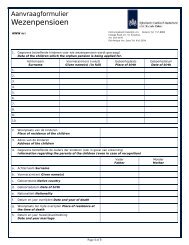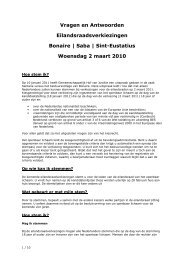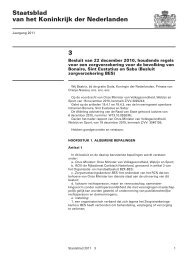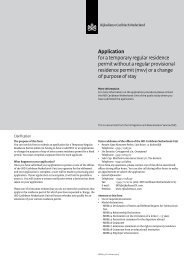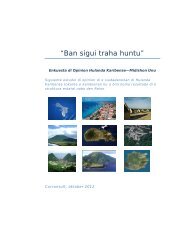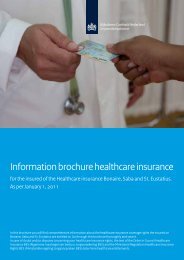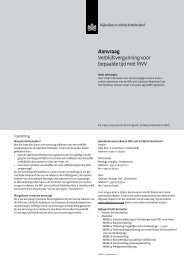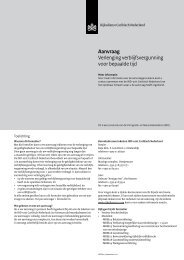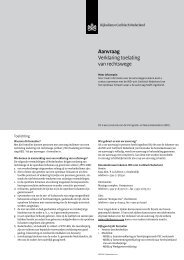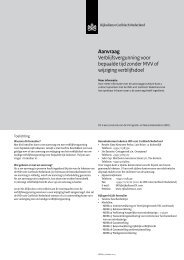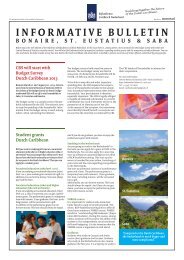WEB BES - Rijksdienst Caribisch Nederland
WEB BES - Rijksdienst Caribisch Nederland
WEB BES - Rijksdienst Caribisch Nederland
Create successful ePaper yourself
Turn your PDF publications into a flip-book with our unique Google optimized e-Paper software.
The Law on education and<br />
vocational education <strong>BES</strong> (<strong>WEB</strong> <strong>BES</strong>)<br />
In the Law on education and vocational education <strong>BES</strong> (<strong>WEB</strong> <strong>BES</strong>) rules which<br />
are applicable for schools for secondary vocational education and vocational<br />
education for adults are stipulated.<br />
a vocational qualification training is required or could be useful. The senior<br />
secondary education (mbo) primarily focuses on youngsters from 16 years and up,<br />
and has three sectors:<br />
1. economy<br />
2. technology<br />
3. service and healthcare education.<br />
05.0<br />
The Law on education and<br />
vocational education <strong>BES</strong><br />
(<strong>WEB</strong> <strong>BES</strong>)<br />
ENG<br />
The senior secondary vocational education (mbo) prepares students for<br />
vocational practice or for a continuation study in the professional higher<br />
education (hbo). The education for adults concerns the education that is given<br />
to adults – meaning those that are not obliged to follow compulsory education<br />
any longer. The financing of education for adults is a direct responsibility of the<br />
Public Entity.<br />
Quality criteria<br />
For the education quality requirements are applicable (the ‘what’). These are<br />
applicable for both public and denominational education, and concern among<br />
others instructions for the courses to be followed, the final terms (eindtermen),<br />
the number of hours for education for each year, the educational and qualification<br />
requirements for teachers, the participation and the obligations concerning<br />
planning and reporting.<br />
On Saba the Caribbean Education system (CXC) and the TVET program are<br />
applicable. Therefore the following information is not completely applicable for<br />
vocational education in Saba.<br />
Qualification levels<br />
The senior secondary education (mbo) is focused on the theoretical and practical<br />
preparation on the execution of professions. This concerns professions for which<br />
De opleidingen worden op vier kwalificatieniveaus aangeboden:<br />
• level 1: the assistant training (duration: 0,5 -1 year)<br />
• level 2: the basic vocational training (duration: 2 - 3 year)<br />
• level 3: the vocational training (duration: 2 - 4 year)<br />
• level 4: the management training (duration: 3 - 4 year) and the specialization<br />
training (duration: 1-2 year after diploma of vocational training)<br />
• Level 1: the assistant training educates for simple executing activities. This level<br />
is meant for participants who are not able to obtain a start qualification (level 2),<br />
but this way still can obtain a diploma. This level is intended for those who left<br />
school early so they can get back into basic vocational training with the objective<br />
to obtain a start qualification (level 2) and for participants who are not able to<br />
reach level 2. This still allows them to finish their education with a diploma.<br />
• Level 2: the basic vocational training educates for executing activities which<br />
are somewhat complicated routines and standard procedures. Obtaining a<br />
diploma on this level means that the participant owns a start qualification,<br />
which each citizen should obtain at the minimum.<br />
• Level 3: the vocational training, which makes graduates able to execute<br />
activities completely independently, report to colleagues and control and give<br />
guidance to others by applying standard procedures.<br />
• Level 4: the management training and the specialization training educate to<br />
completely independently executing activities with broad employability and/or<br />
specialization. This level requires independent profession skills such as acting<br />
tactfully and strategically. The employee will have an hierarchical, formal and<br />
organizational responsibility.
Each level requires certain skills or competences. These skills or competences are<br />
prescribed by means of key tasks and work processes. The competences form the<br />
building blocks for a qualification document for each profession.<br />
Learning paths<br />
Principally all training can be followed through two learning paths:<br />
• An profession educating learning path (beroepsopleidende leerweg - bol), in<br />
which the extend of vocational formation for practice lays between 20 and 60%<br />
(formerly this was called learning working);<br />
• A profession guiding learning path teaching (beroepsbegeleidende leerweg -<br />
bbl) in which the percentage of vocational formation for practice is more than<br />
60% (formerly this was called working learning).<br />
Currently only on Bonaire secondary vocational education is present at all levels,<br />
as part of the school for secondary education. On St. Eustatius and Saba secondary<br />
vocational education will be developed on level 1 and – if this is effective according<br />
to the minister of Education Culture and Science (OCW) - eventually also on level 2.<br />
As of the 1st of August 2011 all mbo-trainings level 1 will be transferred from the<br />
SKJ-organization to the institutions who give vocational education with the<br />
objective to better ensure a continuous learning process of junior and senior<br />
secondary vocational education.<br />
Also see folder: • The Law on education and vocational education <strong>BES</strong> (<strong>WEB</strong> <strong>BES</strong>) - Nr. 5.1<br />
This folder is part of a series of folders listed below:<br />
01.0 The educational system of the Dutch Caribbean<br />
02.0 The Law on compulsory education <strong>BES</strong><br />
03.0 The Law on primary education <strong>BES</strong><br />
03.1 The Law on primary education <strong>BES</strong><br />
04.0 The Law on secondary education <strong>BES</strong><br />
04.1 The Law on secondary education <strong>BES</strong><br />
04.2 The Law on secondary education <strong>BES</strong><br />
05.0 The Law on education and vocational education <strong>BES</strong> (<strong>WEB</strong> <strong>BES</strong>)<br />
05.1 The Law on education and vocational education <strong>BES</strong> (<strong>WEB</strong> <strong>BES</strong>)<br />
06.0 Youth social opportunity program in the Dutch Carribbean<br />
07.0 Employment conditions education personnel<br />
08.0 School vacations in Dutch Caribbean<br />
Explanation of symbols on cover:<br />
School board<br />
School management<br />
Teacher<br />
Local government<br />
This folder is a publication of:<br />
<strong>Rijksdienst</strong> <strong>Caribisch</strong> <strong>Nederland</strong>, OCW<br />
department<br />
For more information, please consult our<br />
website:<br />
www.rijksdienstcn.com



